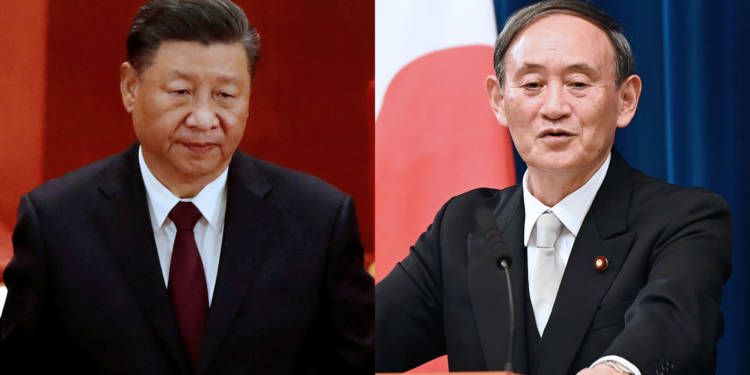Japan’s new Prime Minister Yoshihide Suga is making it clear that he will give absolutely no breathing space to China. Called a foreign policy novice after he succeeded Shinzo Abe, Suga was being seen as someone who wouldn’t be able to replicate his predecessor’s success in checking China’s growing influence. But Suga has now hit China where it hurts the most. Suga is directly attacking Xi Jinping’s flagship foreign policy instrument- the Belt and Road Initiative (BRI) in Southeast Asia.
Recently, Suga visited Vietnam and Indonesia, in what was his first overseas visit as Japan’s PM. By the end of his tour, it became clear that Suga is going to demolish China’s BRI in the ASEAN region. Laos and Cambodia– two of the most vulnerable countries when it comes to Xi Jinping’s BRI were on Suga’s radar. Suga is also looking to create a Japanese parallel to the BRI in other Southeast Asian nations like Myanmar and Thailand.
Suga has shown that he understands how critical countering the BRI is, in order to hold back China’s expansionist ambitions in Southeast Asia. China has been investing heavily in Southeast Asia under the BRI. And as we already know, the BRI is not what China projects it to be. The BRI has no ‘soft power’ angle to it, rather it is an exercise in Chinese usuary.
The Xi Jinping administration uses BRI for doling out commercial loans and then using them as instruments of coercion by debt-trapping weak economies. Take, for example, Laos– a Southeast Asian country, which is today buried under unsustainable Chinese loans. The paper dragon has today occupied the Southeast Asian nation’s national power grid, even as Laos struggles to avoid defaulting on Chinese debt.
Similarly, the BRI is overpowering Cambodia too. In 2019, Cambodia’s debt to GDP ratio stood at 30.09 per cent, largely due to Chinese debt-trap diplomacy. Such excessive Chinese economic influence is dangerous, as it gives Beijing the option of manipulating governments in strategically located Southeast Asian nations like Cambodia. The political regime in Thailand too has been warming up to China’s BRI, even though the people of Thailand remain averse to growing Chinese influence.
China is looking to push the BRI in other Southeast Asian nations like Indonesia and Myanmar, though these countries continue to resist predatory Chinese investments.
Suga has, however, come up with some magnanimous plans to offer Southeast Asia a viable BRI alternative. While delivering a speech at the Vietnam-Japan University, Hanoi, Suga said, “As I see it, the official development assistance (ODA) in combination with investment from Japanese companies have been instrumental in ASEAN’s sustainable development, as if they were the two wheels of a cart.”
Promising further assistance in infrastructure development in the region, the Japanese PM added, “A typical example of ODA cooperation is infrastructure development, which enhances the connectivity of the region. This means building social infrastructure conducive to economic growth such as ports, roads, railways, airports and industrial compounds in an open manner and connecting them across national borders to form economic corridors.”
Suga also said, “Examples of this cooperation include the East-West Economic Corridor and the Southern Economic Corridor running through Vietnam, Laos, Cambodia, Thailand and Myanmar. Japan will continue to support ASEAN countries’ endeavors to strengthen mutual connectivity within the region and develop together as the entire region.”
And Suga’s outreach to the ASEAN has instantly brought rich dividends for Tokyo. Cambodia’s Public Works and Transport Ministry spokesman Kong Vimean told Khmer Times, “We still need Japan’s assistance. Currently, and in the future, Japan will continue with infrastructure projects in the Kingdom.” He added, “Recently, Japan has just provided the Ministry of Public Works with machinery to help develop the infrastructure sector.”
Japan’s Foreign Minister Toshimitsu Motegi too on Friday pledged an emergency loan of ¥25 billion, which is equivalent to $237 million, to Cambodia in order to support the country’s economy which has been battered by the Wuhan Coronavirus pandemic. Motegi also telephoned his Laos counterpart Saleumxay Kommasith and said that Tokyo will support the Southeast Asian nation’s efforts for independent and sustainable development, including its battle against Coronavirus.
Suga has himself pledged low-interest loans of 50 billion yen, that is $473 million, to Indonesia so that Jakarta can battle the economic fallout of the Wuhan Coronavirus pandemic.
Suga is therefore shoring up Japan’s soft power in the ASEAN and making Southeast Asian nations realise that there is somebody ready to give them economic aid and develop their infrastructure, without exploitation. Suga is directly demolishing Xi Jinping’s BRI in Southeast Asia, even as Tokyo looks to kick Beijing out of the ASEAN region.
